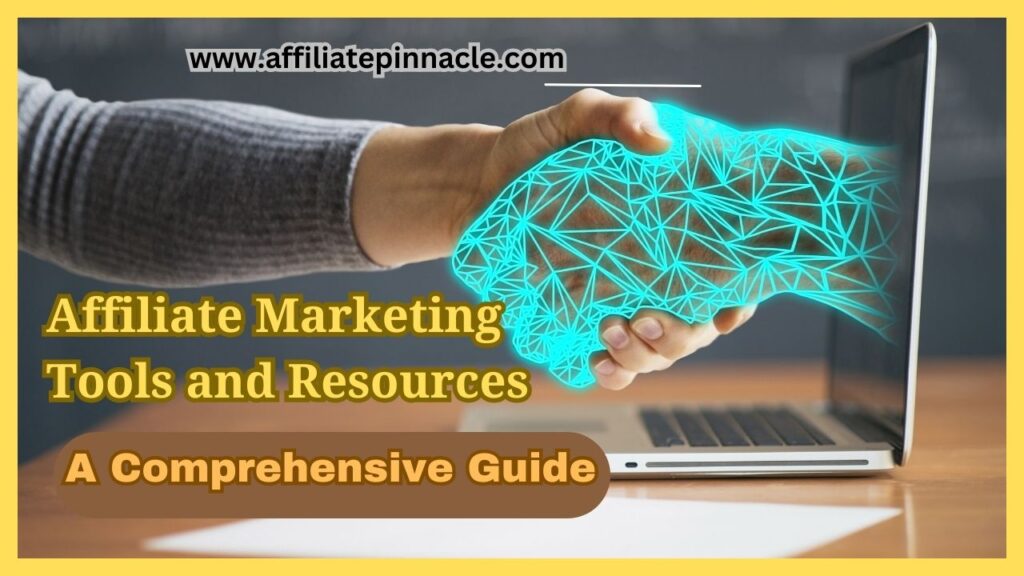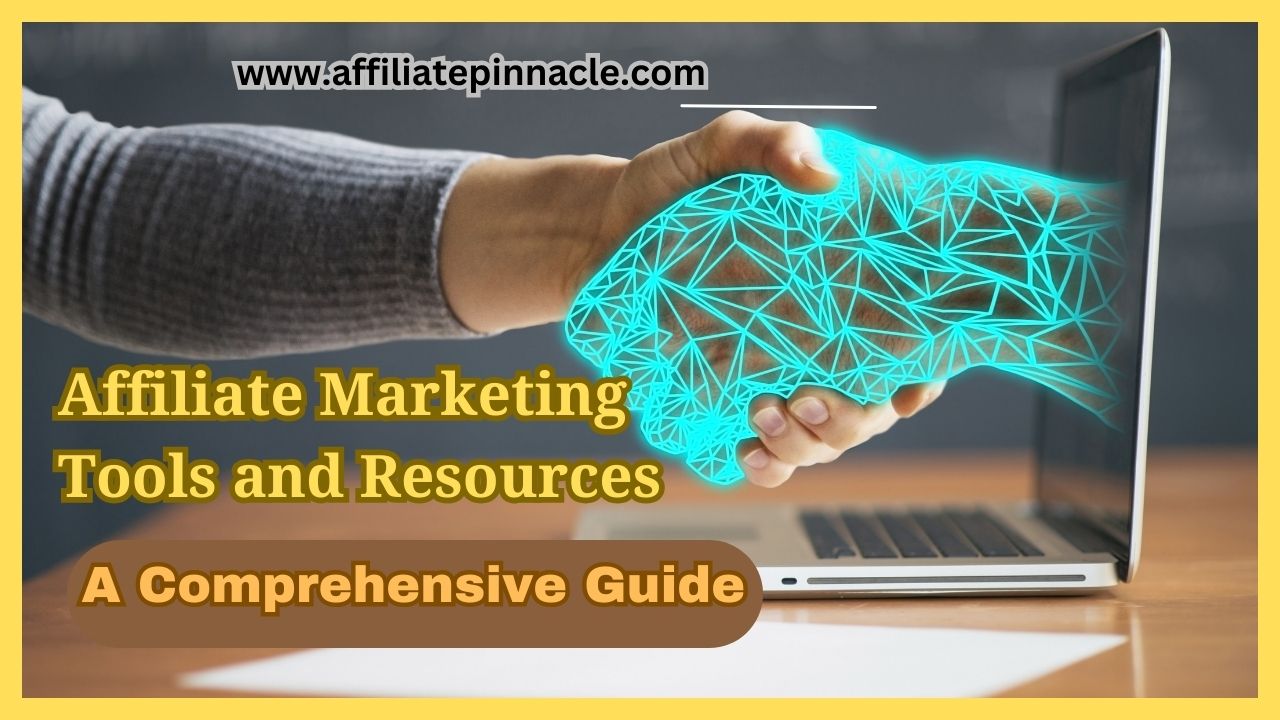Affiliate marketing has emerged as one of the most lucrative online business models. It offers individuals the opportunity to earn money by promoting products or services from other companies and earning a commission for each sale or lead generated. However, succeeding in the affiliate marketing landscape requires more than just enthusiasm; it demands the right tools and resources to maximize your efforts. In this comprehensive guide, we will explore five key affiliate marketing tools and resources that are essential for your success.
“Cash Flow Explosion: Start Earning Big Bucks TODAY – Absolutely FREE Training!”
- Affiliate Networks: The Cornerstone of Affiliate Marketing
Affiliate networks are online platforms that connect affiliates (marketers) with companies looking to promote their products or services. These networks facilitate partnerships, provide tracking and reporting tools, and handle commission payments. Some popular affiliate networks include Amazon Associates, ClickBank, and ShareASale. Joining a reputable affiliate network is often the first step for an affiliate marketer as it opens up a wide range of products and services to promote. - Website and Blogging Platforms: Building Your Online Presence
To succeed in affiliate marketing, you need a platform to reach your audience. A website or blog serves as your digital real estate. Tools like WordPress, Wix, and Blogger allow you to create and maintain a professional online presence. You can use your site to publish valuable content, review products, and embed affiliate links strategically. The quality and relevance of your content play a significant role in attracting and retaining your audience. - SEO and Keyword Research Tools: Getting Found Online
Search engine optimization (SEO) is crucial for organic traffic and visibility. Tools like Google Keyword Planner, SEMrush, and Ahrefs help you identify relevant keywords and phrases in your niche. By optimizing your content for these keywords, you can improve your website’s chances of ranking higher in search engine results pages. Effective SEO practices can lead to more organic traffic, which can increase your affiliate marketing earnings. - Email Marketing Software: Building Relationships and Fostering Trust
Building an email list is an integral part of affiliate marketing. Email marketing software like MailChimp, AWeber, or ConvertKit allows you to collect email addresses, nurture leads, and send targeted promotions. Email campaigns can help you build a loyal audience and establish trust, ultimately leading to higher conversion rates. It’s a powerful tool for maintaining a direct line of communication with your audience. - Social Media and Influencer Marketing Tools: Expanding Your Reach
Social media platforms offer vast opportunities for affiliate marketing. Tools like Hootsuite, Buffer, and Canva can help you manage your social media presence efficiently. By creating engaging content, leveraging influencers, and participating in relevant online communities, you can expand your reach and promote affiliate products or services to a broader audience. Social media is an excellent channel for driving traffic and increasing conversions.
Conclusion
Affiliate marketing is a versatile and potentially lucrative venture, but it requires the right tools and resources to thrive in the competitive digital landscape. By leveraging affiliate networks, building a robust online presence, mastering SEO, using email marketing effectively, and capitalizing on social media, you can maximize your affiliate marketing success. Continuous learning, adaptation, and staying updated with the latest industry trends are also crucial to ensure long-term success in the dynamic world of affiliate marketing. As you explore these tools and resources, remember that success in affiliate marketing is a journey that requires dedication and ongoing effort.

Affiliate Networks
Affiliate marketing has become a prominent means of generating income online, and at the core of this lucrative ecosystem are affiliate networks. These networks serve as intermediaries, connecting affiliate marketers with businesses seeking to promote their products or services. In this article, we will delve into the world of affiliate networks, exploring their significance, benefits, and five key points you should know about them.
“Cash Flow Explosion: Start Earning Big Bucks TODAY – Absolutely FREE Training!”
- Central Hubs for Diverse Offers
Affiliate networks are central hubs housing a wide array of products and services from various industries. This diversity enables affiliate marketers to choose niches that align with their interests, expertise, or target audience. From technology and fashion to health and finance, these networks offer an extensive selection of products to promote, enhancing an affiliate marketer’s ability to cater to a broad audience. - Streamlined Partner Management
Partnering with individual companies can be cumbersome and time-consuming. Affiliate networks simplify this process by providing a unified platform for managing multiple partnerships. Marketers can access a single dashboard to monitor their earnings, track clicks, and view performance reports for all their affiliate programs. This streamlined approach allows for efficient management of multiple campaigns. - Reliable Tracking and Analytics
Effective tracking and analytics are critical in affiliate marketing. Affiliate networks offer advanced tracking tools to monitor clicks, conversions, and commissions. This data empowers marketers to make data-driven decisions, optimize their marketing strategies, and identify which products or campaigns are the most profitable. This information is invaluable for enhancing the overall effectiveness of an affiliate marketing campaign. - Timely Payments and Security
One common concern in affiliate marketing is the reliability of payments. Affiliate networks alleviate this concern by ensuring that payments are made promptly and securely. They serve as trusted intermediaries, holding funds in escrow until sales or leads are confirmed. This secure payment process instills confidence in affiliate marketers, assuring them that they will receive their commissions for the work they put in. - Support and Resources
Affiliate networks often provide valuable support and resources to their affiliate marketers. This assistance may include training materials, webinars, and dedicated account managers who offer guidance and assistance. Additionally, networks frequently update their affiliates on industry trends and best practices, empowering them to stay competitive and successful in the dynamic world of affiliate marketing.
Conclusion
Affiliate networks are the backbone of the affiliate marketing industry, offering a myriad of opportunities for affiliate marketers to connect with businesses and promote products or services. These networks simplify the process of partnership management, provide reliable tracking and analytics tools, ensure secure and timely payments, and offer invaluable support and resources. When entering the world of affiliate marketing, consider joining reputable affiliate networks to tap into their benefits and access a vast array of affiliate programs. By leveraging these networks, affiliate marketers can enhance their chances of success and unlock the power of profitable partnerships.
Website and Blogging Platforms
In the digital age, having an online presence is essential for individuals, businesses, and content creators. Websites and blogging platforms provide the foundation for expressing ideas, sharing information, or even building an online business. In this article, we will explore the importance of website and blogging platforms, along with five key points to consider when choosing the right one for your needs.
- Versatility in Content Creation
Websites and blogging platforms offer unparalleled versatility in content creation. Whether you’re a passionate writer, a budding photographer, or a small business owner, these platforms provide a canvas for showcasing your work. You can publish articles, upload images, videos, podcasts, and more. This versatility enables you to reach and engage with a wide and diverse audience. - User-Friendly Interface
Many website and blogging platforms are designed with user-friendliness in mind. Popular platforms like WordPress, Wix, and Blogger provide intuitive interfaces that make it easy for both tech-savvy individuals and beginners to create and manage content. You don’t need advanced coding skills to get started; most platforms offer drag-and-drop features, customizable templates, and built-in tools for editing. - Search Engine Optimization (SEO) Integration
SEO is crucial for driving organic traffic to your website or blog. Many website and blogging platforms integrate SEO features or offer plugins to optimize your content for search engines. This can help your content rank higher on search engine results pages, increasing your visibility and attracting more visitors. - Responsive Design for Mobile Users
With the increasing use of mobile devices, having a responsive website is essential. The leading website and blogging platforms ensure that your site is accessible and looks great on smartphones and tablets. This mobile responsiveness enhances the user experience and can positively impact your search engine rankings. - Monetization and E-commerce Opportunities
Websites and blogs can serve as more than just platforms for expression; they can be income-generating tools. Many platforms allow for easy integration of e-commerce features and ad placement, enabling you to monetize your content. Whether you want to sell products, promote affiliate marketing links, or display ads, these platforms provide the infrastructure to support your income-generating goals.
Additional Considerations:
- Community and Support: Some platforms have thriving communities and extensive support networks. When you encounter technical issues or have questions, having access to a helpful community can be a lifesaver.
- Customization and Scalability: Consider the extent to which you can customize your site and whether the platform can scale with your growing needs. A platform that allows for expansion is valuable for long-term success.
- Security: Security is a critical aspect. Ensure that the platform offers robust security features and regular updates to protect your site and its visitors from potential threats.
- Cost and Pricing Plans: Evaluate the cost of using a specific platform and the pricing plans available. Some platforms offer free basic plans with the option to upgrade for advanced features.
Conclusion
Website and blogging platforms have democratized online content creation, allowing individuals and businesses to establish their online presence with ease. Their versatility, user-friendly interfaces, SEO integration, responsive design, and monetization opportunities make them indispensable tools for the digital age. When selecting a platform, consider not only its features but also the specific needs of your project or business. The right platform can be your gateway to successful online expression and engagement.
SEO and Keyword Research Tools
In the highly competitive digital landscape, effective search engine optimization (SEO) is crucial for enhancing online visibility. SEO and keyword research tools have become indispensable for businesses and content creators looking to rank higher on search engine results pages (SERPs). In this article, we will explore the significance of SEO and keyword research tools and highlight five essential points to consider when using them to improve your online presence.
“Cash Flow Explosion: Start Earning Big Bucks TODAY – Absolutely FREE Training!”
- Enhanced Content Relevance
SEO and keyword research tools empower you to create content that aligns with the interests and needs of your target audience. By analyzing the keywords and phrases that are relevant to your niche, you can tailor your content to provide valuable information or solutions. This, in turn, improves user engagement and boosts the chances of your content being ranked higher by search engines. - Competitive Analysis
These tools allow you to conduct competitive analysis by identifying the keywords that your competitors are ranking for. This knowledge helps you understand the landscape of your niche and uncover opportunities for content optimization. You can also learn from your competitors’ strategies and find ways to outperform them in SEO rankings. - Long-Tail Keywords and User Intent
SEO tools enable you to discover long-tail keywords—more specific, longer phrases that potential users might use in their search queries. Understanding user intent through keyword research tools helps you tailor your content to directly address what your audience is looking for, increasing the chances of conversions and higher rankings. - Tracking and Performance Metrics
Accurate tracking and performance metrics are critical for monitoring the impact of your SEO efforts. These tools offer insights into your website’s traffic, ranking changes, and conversion rates over time. This data helps you adapt your SEO strategy and make informed decisions to improve your online visibility continually. - Technical SEO Optimization
SEO tools provide valuable insights into the technical aspects of your website, such as site speed, mobile-friendliness, and broken links. Addressing these technical issues not only improves user experience but also satisfies search engine ranking criteria. SEO tools help you identify and rectify these issues to ensure your website is search-engine-friendly.
Additional Considerations:
- Local SEO: Some SEO tools offer features for local SEO, helping businesses target specific geographic areas. This is crucial for brick-and-mortar businesses and services that cater to a local audience.
- Backlink Analysis: Backlinks from authoritative websites are vital for SEO. Some tools offer backlink analysis to help you monitor and improve your backlink profile.
- Content Strategy: SEO tools can assist in developing a content strategy by suggesting topics, providing keyword difficulty scores, and tracking the performance of individual pieces of content.
- Regular Updates: SEO algorithms and best practices change frequently. Look for tools that offer regular updates and adapt to industry changes.
Conclusion
SEO and keyword research tools are indispensable in the quest for online visibility and success. By enhancing content relevance, conducting competitive analysis, focusing on long-tail keywords and user intent, monitoring performance metrics, and optimizing technical SEO, you can achieve higher search engine rankings. Consider additional features like local SEO, backlink analysis, and content strategy to fine-tune your SEO efforts. Ultimately, these tools are your keys to unleashing the full potential of your online presence and ensuring that your content reaches its intended audience.
Email Marketing Software
Email marketing remains a powerful tool in the digital marketer’s arsenal, helping businesses connect with their audience and drive engagement. However, managing email campaigns can be a daunting task without the right tools. Email marketing software comes to the rescue, streamlining the entire process and offering numerous benefits. In this article, we will explore the significance of email marketing software and provide five additional points to consider when using these tools to supercharge your email marketing efforts.
- Automation for Efficiency
One of the primary benefits of email marketing software is automation. These platforms allow you to set up automated email sequences, including welcome emails, follow-ups, and abandoned cart reminders. Automation ensures that your audience receives timely and relevant messages without constant manual intervention, saving you time and improving the user experience. - Personalization for Relevance
Personalization is key to effective email marketing. These tools enable you to segment your email list based on various criteria, such as demographics, purchase history, and engagement levels. By sending tailored content to specific segments, you can significantly improve the relevance of your messages, leading to higher open rates and conversions. - A/B Testing for Optimization
Email marketing software provides A/B testing features that allow you to experiment with different elements of your emails, such as subject lines, content, and send times. By analyzing the results, you can continually refine your email campaigns, increasing their effectiveness over time. This data-driven approach helps you make informed decisions to boost your email marketing performance. - Compliance and Deliverability
Email marketing software often includes features to help you stay compliant with email marketing laws and regulations, like the CAN-SPAM Act. This ensures that your emails are not marked as spam and are more likely to reach your subscribers’ inboxes. These tools also monitor your sender reputation, helping maintain a high level of deliverability. - Detailed Analytics for Informed Decision-Making
These platforms offer in-depth analytics to track the performance of your email campaigns. You can measure open rates, click-through rates, conversion rates, and more. Additionally, you can gain insights into the behavior of your subscribers, helping you understand what content resonates with them and adjust your strategy accordingly.
Additional Considerations:
- Integration with other Tools: Some email marketing software can integrate with your customer relationship management (CRM) software or e-commerce platform, allowing for seamless data synchronization and more advanced targeting.
- Responsive Design and Testing: Ensure your email marketing software provides responsive design templates and testing options to ensure your emails look great on various devices and email clients.
- Spam Score Checks: Some tools offer spam score checks to assess the likelihood of your email ending up in the spam folder, allowing you to make necessary adjustments.
- List Management: Robust list management features can help you maintain a clean, engaged subscriber list and handle unsubscribes and bounces efficiently.
- Multichannel Marketing: Some email marketing software extends to multichannel marketing, enabling you to connect with your audience through various digital channels, such as social media and SMS.
Conclusion
Email marketing software is a game-changer for digital marketers, offering automation, personalization, A/B testing, compliance, and detailed analytics. By considering additional features such as integration options, responsive design, spam score checks, list management, and multichannel marketing, you can optimize your email marketing strategy and achieve better results. These tools are your secret weapon for building and nurturing customer relationships, boosting engagement, and driving conversions through the power of email.
Social Media and Influencer Marketing Tools
Social media and influencer marketing have become central to digital marketing strategies. Engaging with audiences on popular social platforms and leveraging the influence of key figures in your niche can significantly boost your brand’s visibility and reputation. However, the intricacies of this space demand the right tools to succeed. In this article, we will explore the importance of social media and influencer marketing tools and provide five additional points to consider when using them to supercharge your online presence.
“Cash Flow Explosion: Start Earning Big Bucks TODAY – Absolutely FREE Training!”
- Content Scheduling and Management
Social media and influencer marketing tools offer advanced content scheduling and management features. This enables you to plan and schedule posts in advance, ensuring a consistent and timely presence on various social platforms. With these tools, you can also track the performance of your posts, engage with your audience, and manage multiple social accounts from a single dashboard. - Competitor Analysis and Market Insights
Comprehensive tools in this category often include features for competitor analysis and market insights. You can monitor the strategies and content of your competitors, track industry trends, and stay informed about what’s happening in your niche. This knowledge can guide your own social media and influencer marketing efforts, helping you stay competitive and relevant. - Influencer Discovery and Collaboration
For influencer marketing, these tools provide influencer discovery and collaboration platforms. They help you identify potential influencers in your niche, evaluate their reach and engagement, and facilitate collaboration through outreach and campaign management features. This streamlines the influencer marketing process, making it easier to connect with influencers who can amplify your brand’s message. - Analytics and ROI Tracking
Social media and influencer marketing tools offer advanced analytics and ROI tracking features. You can measure the performance of your social media campaigns and influencer collaborations, including engagement, reach, and conversion data. This data-driven approach helps you understand which strategies are the most effective and where to allocate your resources for the best return on investment. - User-Generated Content and Community Building
Some tools also assist in user-generated content curation and community building. These features allow you to showcase content created by your audience and foster a sense of community around your brand. User-generated content can boost credibility and trust, while community building creates a loyal fan base that can be highly beneficial for your marketing efforts.
Additional Considerations:
- Hashtag and Trend Monitoring: Tools that offer hashtag and trend monitoring capabilities can help you capitalize on trending topics and amplify your content’s reach.
- Social Listening: Social media listening tools allow you to monitor conversations around your brand and industry, enabling you to engage in real-time and address issues or opportunities promptly.
- Influencer Relationship Management (IRM): Some tools specialize in influencer relationship management, assisting you in building and nurturing long-term relationships with key influencers.
- E-commerce Integration: For businesses, tools that seamlessly integrate with e-commerce platforms can be valuable, as they enable direct sales and tracking of conversion data from social media.
- Data Security and Compliance: Given the increasing focus on data privacy, consider tools that prioritize data security and comply with regulations like GDPR and CCPA.
Conclusion
Social media and influencer marketing tools are essential for navigating the dynamic landscape of online influence. By considering their content scheduling and management capabilities, competitor analysis, influencer discovery, analytics, and community-building features, you can optimize your strategies for success. These tools empower you to engage with your audience effectively, collaborate with influencers, and measure the impact of your efforts, ultimately leading to a stronger online presence and increased brand recognition.
“Cash Flow Explosion: Start Earning Big Bucks TODAY – Absolutely FREE Training!”
I appreciate you reading my full article,Affiliate Marketing Tools and Resources: A Comprehensive Guide



